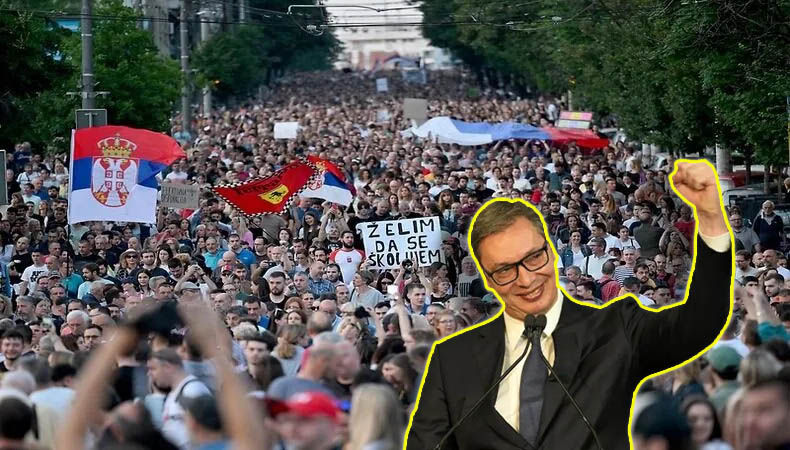
- President Vucic has accused Western powers of sponsoring the unrest due to his steadfast ties with Russia and refusal to abandon Serbia’s claim to Kosovo.
- In contrast, the opposition protesters paint a picture of discontent and a desire to “liberate institutions.”
- Vucic’s emphasis on foreign interference sheds light on the geopolitical implications of Serbia’s relationships with both Western powers and Russia.
The political landscape in Belgrade has been thrust into turmoil as pro-Western demonstrators sought to breach government buildings, prompting Serbian President Aleksandar Vucic to denounce the incident as an attempted “color revolution.” The subsequent clashes between protesters and the police have brought to the forefront deep-seated political discontent.
Background
The genesis of this unrest lies in the parliamentary elections that saw Vucic’s Serbian Progressive Party emerge victorious over the pro-EU Serbia Against Violence coalition. Dissatisfied with the results, thousands of pro-Western opposition protesters gathered outside the Belgrade City Assembly, escalating the situation into violence as some attempted to forcefully enter the government building.
President’s Response
President Vucic, in a public address, not only downplayed the notion of a revolution but also employed strong language, referring to the protesters as “thugs.” Interestingly, Vucic claimed to have been forewarned about the plot, insinuating foreign involvement. He specifically accused Western powers of sponsoring the unrest due to his steadfast ties with Russia and refusal to abandon Serbia’s claim to Kosovo.
Color Revolution Allegations
The term “color revolution” resurfaced in Vucic’s discourse, describing a protest movement orchestrated by a foreign government, typically the U.S., to topple leaders perceived as contrary to U.S. interests. Vucic expressed gratitude to unnamed foreign services for intelligence that supposedly revealed the protesters’ plans, reinforcing his narrative of external meddling.
Protesters’ Perspective
In contrast, the perspective of the opposition protesters paints a picture of discontent and a desire to “liberate institutions.” The Green-Left Front’s Radomir Lazovica emphasized a non-violent approach, calling for dialogue and understanding. Despite these calls, clashes with the police ensued, resulting in injuries and the arrest of at least 35 individuals deemed provocateurs.
Russian Involvement and Contradictory Statements
A noteworthy twist in the narrative emerged when Prime Minister Ana Brnabic expressed gratitude to Russian security services for alerting Belgrade to potential riots. This contradicted Vucic’s earlier statements thanking unnamed foreign services, revealing a complex web of intelligence sharing and international dynamics.
Geopolitical Implications
The unrest in Belgrade unveils the intricate interplay of domestic politics and geopolitics. Vucic’s emphasis on alleged foreign sponsorship sheds light on the geopolitical implications of Serbia’s relationships with both Western powers and Russia. The conflicting reports about the origin of intelligence underscore the complexities surrounding the situation.
Conclusion
As Belgrade grapples with political unrest, the conflicting narratives surrounding the incident bring to light the intricate geopolitical games in the region. Whether this turmoil will lead to a reevaluation of Serbia’s geopolitical allegiances or further exacerbate tensions remains uncertain, but it undoubtedly underscores the delicate balance Serbia maintains in navigating its relationships on the international stage.
(The author is a post-graduate student in International Relations at Kalinga University, Raipur. Views and opinions expressed are the author’s own)
Aayush Pal is a freelance writer on contemporary geopolitical developments. The views expressed in his work are entirely his own.
